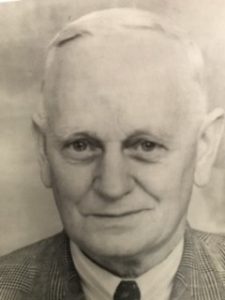My Paternal Grandpa

Thomas Lievesley Rowlands. My paternal grandfather.
A man of few words. Quiet by nature. Born to a family of millers in Bristol, England. A son of Victorian England in style and manner. Regarding faith, a Quaker. Emigrated to South Africa with other members of the Rowlands family in the late 1800’s, primarily for health reasons.
I knew him to be a stern man. Not the kind of grandfather into whose lap you would crawl for physical affection.
But when he prayed… you felt like you were listening to Moses calling on God on the summit of Sinai.
God was near.
Critics might be tempted to assign the style and manner of his praying to personality or emotion, but that would require you to dismiss everything you knew about him. Grandpa Rowlands was anything but emotional nor captive to any style or oratorical flair.
No.
The manner in which he prayed was an indication that he knew God, intimately, that he was in awe of God’s presence and, therefore, came before Him with an urgency that was tempered only by the respect creation has before its Creator.
My Dad used to tell stories, from his childhood, of hearing Grandpa Rowlands praying on top of a hill behind the family farmhouse. Leaning up against a huge boulder before the day’s chores, he began to call on the Lord. Dad said you could hear Grandpa’s voice all over the farmyard. That was where Dad first heard his Dad calling on God for revival in the land.
I don’t know why I remember the name of the farm, except from Dad’s stories, but it was called, Pentyre.
Maybe one of the things that helped shape Grandpa Rowlands’ way of praying was a story my Dad told about the second or third year in a row that the crops on the farm had been wiped out by violent thunder storms and hail. To lose the crops again, on this particular year, would have meant the end of the farm, and you could see the storms rolling towards the Rowlands’ farm from the east. Grandpa Rowlands climbed up the hill and, like Moses, stretched his hands out towards the approaching storm, and called on the Lord. Miraculously, Dad said, the storm stopped literally at the eastern boundary line of the farm. The crops were harvested and the farm saved.
My daughter, Vanessa, sent me a podcast yesterday by John and Lisa Bevere on fervent prayer and my mind went straight to Grandpa Rowlands. The podcast was not a call for praying with volume or emotion for the sake of emotion; indeed, God is not deaf. But it was a call to come before God with a passion worthy of being in His holy presence, with an urgency that speaks of our desperate need for Him and with the confident faith that, through prayer, God changes things.
The New King James version of James 5:16b reads, “The effective, fervent prayer of a righteous man avails much.” The two Greek words for this kind of fervent prayer literally mean, “that which is urgently requested.” Even the writer of Hebrews says of Jesus’ prayers, “In the days of His flesh, He offered up both prayers and supplications with loud crying and tears to the One able to save Him from death, and He was heard because of His piety.” (Hebrews 5:7)
I wonder if some of our prayers may not be answered because they are offered with such casual passivity that, if we are all honest, betrays little, if any, expectation that our prayers will be heard or make any difference.
I have a charcoal drawing in my office, done by Grandpa Rowlands, that says, “Prayer Changes Things.” I have a second drawing done by him, not surprisingly, that says, “Think Magnificently of God.” Both used to hang in my father’s study. They are now are in my study and speak volumes about the quiet man from Bristol, England, who prayed like Moses on the top of Sinai.
